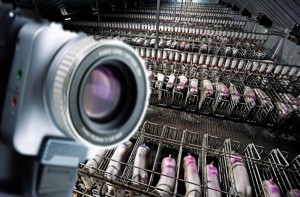In a victory for animals and freedom of speech, a federal judge has just ruled that Utah’s ag-gag law is unconstitutional, for violating the First Amendment. Judge Robert Shelby found that the law, which he wrote is “perfectly tailored toward … preventing undercover investigators from exposing abuses at agricultural facilities,” suppresses “broad swaths of protected speech without justification.”
Though the meat, egg, and dairy industries desperately try to hide the suffering of animals behind closed doors, time and again Compassion Over Killing investigations reveal rampant animal abuse on factory farms — including our gut-wrenching 2015 investigative video filmed inside a Mountaire Farms chicken slaughterhouse in North Carolina at the same time as the state’s dangerous ag-gag bill aimed at silencing whistleblowing made its way through the legislature. That bill was enacted in 2016.
The decision in Utah comes on the heels of a similar outcome in Idaho: in 2015, a federal judge struck down Idaho’s ag-gag law for violating the First and Fourteenth Amendments. The Utah decision rested entirely on First Amendment analysis.
Utah passed its ag-gag law in 2012 and criminalized filming agricultural facilities and obtaining access under “false pretenses,” making undercover investigations at factory farms and slaughterhouses illegal. Animal Legal Defense Fund, PETA, and Amy Meyer — the first person to be charged under the law — sued Utah, arguing that the statute was unconstitutional. Last Friday, the U.S. District Court agreed.
Judge Shelby found that the speech targeted by the ag-gag law was protected under the First Amendment, and he rejected Utah’s defense that the law intended to protect animals and employees, calling these reasons “entirely speculative” and therefore not compelling enough to curb free speech.
The Court’s decision underlines the constitutional rights of whistleblowers and the importance of undercover investigations by COK and other groups, which have been instrumental in shedding light on cruel animal agribusiness practices. Consumers have the right to know where their food comes from and how the animals are raised and treated.

